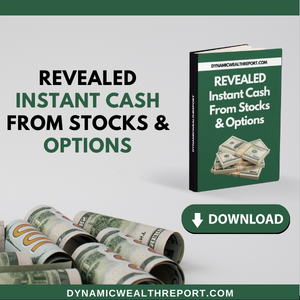How To Start Investing With Little Money
 How many of us wish we could go back and tell our younger selves what not to do? If I had the opportunity, one bit of advice I would probably have given myself is this: Start a habit of investing with little money instead of racking up credit card debt. I am not sure where you are in your life, how much money you have in your pockets or in your checking account, but when you are free of high-interest consumer debt, you should consider if investing is right for you.
How many of us wish we could go back and tell our younger selves what not to do? If I had the opportunity, one bit of advice I would probably have given myself is this: Start a habit of investing with little money instead of racking up credit card debt. I am not sure where you are in your life, how much money you have in your pockets or in your checking account, but when you are free of high-interest consumer debt, you should consider if investing is right for you.
With that in mind, let’s explore these questions:
- What do I need to know before I start investing?
- Is it really possible to start investing with little money?
- Is it better to invest in stocks or mutual funds?
- Investing Apps to Start Investing Money
- What else should you know about investing?
Before we get started, you need to know it is beyond the scope of this blog to provide investment, legal or tax advice. Instead, I offer you some foundational knowledge to help you become better informed. While many self-taught people have successfully invested their money, it is always a good idea to seek out the advice of a professional.
What do I need to know before I start investing?
Some financial advisors will say it is important to understand your risk tolerance. Are you someone who likes to be aggressive and shoot for bigger gains, or would you rather have a slow and steady approach to building up your investments? This might impact, the stocks, bonds, mutual funds, or exchange-traded funds you invest in.
There is another approach, and that is to establish a goal you want to reach through your investing, consider how long of a timeline you have to reach that goal, and work with someone to develop a portfolio to help you reach those goals.
No matter what your risk tolerance is, there are no sure bets when it comes to investing. You have to be OK with losing everything you invest. The Great Recession of 2007-2009, wiped out a lot of wealth. For many seniors, their retirement funds were severely hit. If you needed money right away, it was challenging. But for those who were younger and not looking to sell any of their investments, they saw their values crash, only later to see them return better than before.
Use money you are okay with losing.
Because investing involves risk, only use money you are OK with losing. Don’t hurt your family’s financial footing hoping for a quick payday investing in a stock. If you want to buy stock in a single company, historically, it has been a better option to buy and hold.
A way some investors minimize risk is choosing a mutual fund or ETF with a well-diversified portfolio that does not have high fees.
One more thing: Generally, the markets are on a general upward trend with a lot of little ups and downs … and sometimes some big downturns the experts call corrections. Be prepared to ride it out. When the markets tumble, some people look at it as if everything is now on sale. Do you like getting 20 to 30 percent off at the store?
Is it really possible to start investing with little money?
Yes, it is. The advent of mutual funds allowed people to invest money in a diverse group of companies with a minimum up-front investment. Mutual funds are a way of pooling money from a lot of smaller investors to buy stocks in a variety of industries. What people like about mutual funds, other than it they are an easy way to start investing, is that they take a lot of the guesswork out of the equation.
Mutual Funds
Mutual funds are led by professional managers. They will be the ones determining what companies to buy and what companies to sell. They involve a wide variety of companies to help minimize risk. Some start-up companies looking to disrupt a particular industry (think of what Netflix did to video rental stores like Blockbuster) have a big upside, but they are risky. So, a mutual fund might have some solid companies with a proven historical track record to offset the risk. Whenever you manage risk, you protect against deep losses. However, it can also minimize steep gains.
Index Funds
Index funds are a type of mutual fund that contain shares of all the companies in a particular market (like the S&P 500) so your returns will match closely the performance of the broader market. These are considered passive investments because they are not actively managed. Something similar to the index funds are sector funds. These focus on specific industries. The collection of investments within a fund is called the portfolio.
Exchange-Traded Funds (ETFs)
Exchange-traded funds (ETFs) are kind of like mutual funds, but there are some distinctions. Companies create these ETFs that purchase stocks, bonds and other investments into a single entity. They then sell shares in the same manner as stocks. The price can fluctuate throughout the day, and you can seek to purchase them at any time. They are designed to mirror specific markets, industries, or companies. When mutual funds shares are bought or sold, they are based on the price at the close of each business day. Mutual funds are actively managed, and ETFs are passively managed.
Types of Investing Accounts to Get Started Investing
Before you can invest, you will need to open up an account. There are so many different ways to invest, but I want to focus on two for now: Through employer-run 401(k) and 403(b) plans and through brokerage accounts, whether traditional or discounted.
If you work for a larger company or a non-profit organization, you might qualify to invest in its retirement plan, usually a 401(k) plan or 403(b) plan. You can invest a little bit of money each pay period. You will need to see if you are eligible and find out if your employer matches any of your investment. Some do, but others don’t. These are considered retirement savings accounts. Unlike a regular savings accounts, the plan is to keep your money in these IRAs until retirement and not withdraw your funds for any or every reason. You can always access your money, but there are stiff penalties if you do.
With an employer-run plan, you will open your account when you fill out the appropriate paperwork. The other account I want to look at is a brokerage account.
You can open a traditional, full-service brokerage account where you will work with a person who will act as a sounding board for your investment goals and will make the trades for you. They can guide you through purchasing single stocks, mutual funds, index funds, exchange-traded funds and other investment opportunities.
There are discount brokers, many of them online, where you will make every decision and manage your own investments. There are a number of online brokers, and some cater to investors with a lot of experience, while others have some educational features and customer support for beginners.
There are brokerage firms, like Charles Schwab, that offer mutual funds where you can start investing with as little as $100. Fidelity Investments has some that require no minimum, though you will probably have to open an account with one of their retail brokerage firms (be sure to read the fine print). Ellevest also offers a plan with no minimum, so investors can start investing with just $1.
Investing Apps to Start Investing Money
Acorns is a micro-investing app geared toward college-aged investors. When you link a credit or debit card to your Acorns account, whenever you make a purchase, the app will round up the balance to the nearest dollar and transfer that money into your investment account. If you purchase an iced coffee for $3.25, then Acorns will take 75 cents and invest it for you.
There are no minimums to Acorns, but it will take $5 to start investing. You can round up your change to invest, and you can also schedule regular, fixed deposits into your investment account. Acorns offers five different investment accounts based on your risk tolerance ranging from conservative to aggressive.
For college students with a valid .edu email address. Acorns will provide four years of free service. For the rest of us, we will pay a monthly fee ranging from $1 to $3 a month, depending upon the type of account: $1 a month for a taxable investment account; $2 a month for an IRA; or $3 if you sign up for Acorns checking account. If you are investing just a little bit each month, say $10, then a $1 fee will be 10 percent. While the fee is quite reasonable, it can eat up a large percentage when your investment balance is low. But, for college students, it will give you four years to build that fund up.
Is it better to invest in stocks, mutual funds, ETFs or index funds?
As with most things in life, the answer is, “It depends.” Investing in stocks can be better than investing in mutual funds if you buy the right stock at the right time and sell at the right time. It is so tricky, not to mention risky. The average growth of the S&P 500 has been around 10 percent a year since 1926 and closer to 8 percent since moving to 500 companies in the late 1950s.
Employer-matched retirement savings through 401(k)s and 403(b)s opened up the world of investing to many people. Those who want to invest more outside of those IRAs start looking at opening up brokerage accounts, which will open up more investment opportunities at varying levels of risk.
Should you go with a brokerage account?
As your financial health improves, take inventory of your goals and see what other kinds of investment opportunities beyond your retirement account can help you get closer to achieving them. This might be the time you want to open a brokerage account. Remember, there is the full-service brokerage account that will provide guidance and direction. You will be a fee for this assistance. Then, there is the discounted broker that offers you a way to purchase investments, but you are left to your own devices. Because of this, you will likely pay lower fees.
If you go the brokerage account route, there are more opportunities at all risk levels. Keep in mind all investments involve some level of risk. People have done well with index funds and exchange-traded funds. With these kinds of investments, you are not really trying to pick and choose winners, rather investing in an entire index, industry or sector.
There are so many different kinds of mutual funds that focus on growth stocks, international companies, large companies, small companies, you name it, there is probably a mutual fund for it. You can see the historical performance of some top mutual funds here.
What else should you know about investing?
You have a lot to think about. I hope you are better prepared to start investing, even if it is with a little bit of money. The old adage is true: Pennies make nickels; nickels make dimes; dimes make quarters; quarters make half dollars; and half dollars make dollars. You have to start somewhere, perhaps it is will just rounding up with Acorns. Maybe you have a 401(k), and you are ready to see if Blooom can make what you have invested go even further. Or, maybe you are ready to tie investing to your life goals and want to check out Ellevest.
The thing you need to know is that perhaps the best time to invest was right at the height of the Great Recession because everything was on sale. However, the next best time is today. Get started. You won’t regret it.
Note: This article originally appeared at The Budget Mom.
Category: Personal Finance



